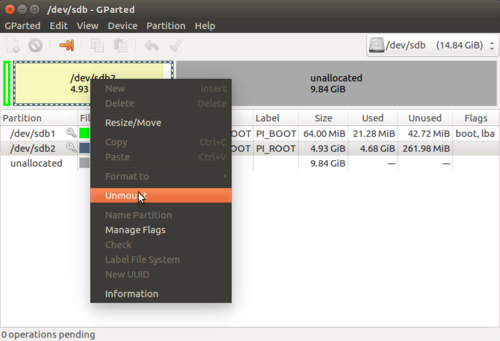Difference between revisions of "HamsterFilesystemResizing"
From cogniteam
| Line 13: | Line 13: | ||
<code><span style="color:brown">daria@daria:</span>sudo gparted</code> | <code><span style="color:brown">daria@daria:</span>sudo gparted</code> | ||
| − | 3. Check your SD's partition - /dev/sd* | + | 3. Check your SD's partition - /dev/sd* |
| − | "*" - could be B,C etc., depends of your local environment | + | |
| + | "*" - could be B,C etc., depends of your local environment. | ||
| + | |||
<strong>!!Be careful with SD partition recognition to avoid data loosing</strong> | <strong>!!Be careful with SD partition recognition to avoid data loosing</strong> | ||
4. Select /dev/sd*2 (label PI_ROOT) partition and do "unmount" in case it mounted. | 4. Select /dev/sd*2 (label PI_ROOT) partition and do "unmount" in case it mounted. | ||
| + | |||
To unmount partition right click on /dev/sd*2 partition->unmount. | To unmount partition right click on /dev/sd*2 partition->unmount. | ||
[[File:Screenshot from 2018-07-15 14-19-22.png|500px]] | [[File:Screenshot from 2018-07-15 14-19-22.png|500px]] | ||
Revision as of 11:26, 15 July 2018
Hamster SD filesystem resizing
After image writing follow this steps:
1. Install gparted:
daria@daria:sudo apt-get install gparted
2. Run gparted in terminal:
daria@daria:sudo gparted
3. Check your SD's partition - /dev/sd*
"*" - could be B,C etc., depends of your local environment.
!!Be careful with SD partition recognition to avoid data loosing
4. Select /dev/sd*2 (label PI_ROOT) partition and do "unmount" in case it mounted.
To unmount partition right click on /dev/sd*2 partition->unmount.
